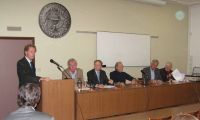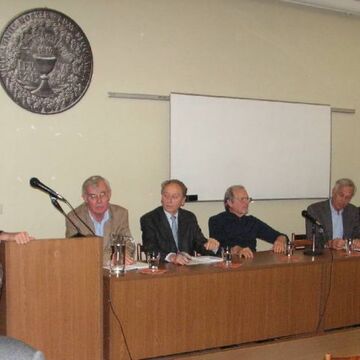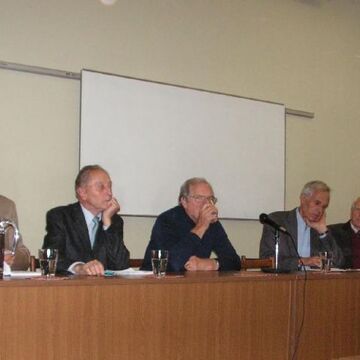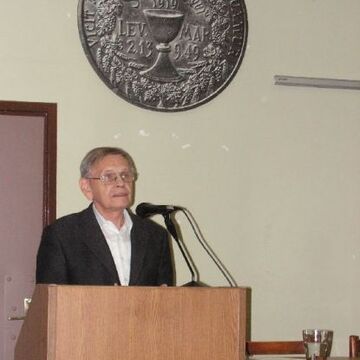Conference “Protestants in the 20th Century between Faith, Dreams, and Power”
 On 3 and 4 November 2011 the Protestant Theological Faculty held a conference on the different ways in which Protestants tried to find their positions in the political context of the division of Europe during the Cold War. The conference took place in the framework of a research project at the Department of Church History of the Faculty about the role and significance of the Czech theologian Josef Lukl Hromádka in the Czech Protestant community. For the last four years a team of three church historians have been studying various documents from church, state and private archives. Hromádka’s correspondence contained a wide range of contacts with theologians at home and elsewhere, with ecumenical leaders and organizations, with political leaders, and with members of the Evangelical Church of Czech Brethren (ECCB). His “sphere of influence” went significantly beyond his own Czech Protestant milieu.
On 3 and 4 November 2011 the Protestant Theological Faculty held a conference on the different ways in which Protestants tried to find their positions in the political context of the division of Europe during the Cold War. The conference took place in the framework of a research project at the Department of Church History of the Faculty about the role and significance of the Czech theologian Josef Lukl Hromádka in the Czech Protestant community. For the last four years a team of three church historians have been studying various documents from church, state and private archives. Hromádka’s correspondence contained a wide range of contacts with theologians at home and elsewhere, with ecumenical leaders and organizations, with political leaders, and with members of the Evangelical Church of Czech Brethren (ECCB). His “sphere of influence” went significantly beyond his own Czech Protestant milieu.
During the opening session of the conference five theologians and ecumenical workers (Laurens Hogebrink, Petr Pokorný, Konrad Raiser, Werner-Christoph Schmauch and Jakub Trojan) talked about their personal experiences of relations between Czech Protestants and ecumenical organizations during the Cold War. One of the conclusions of their debate was that organizations like the World Council of Churches (WCC) had not sufficiently tried to listen to and to support the critical voices of the dissidents in the ECCB.
The first papers presented at the conference were about the local and international context of Hromádka’s work. Juha Merilainen from Finland analyzed the strategy of the program of the WCC for the reconstruction of European churches after the Second World War. Ondřej Matějka from Prague described how though his personal approach to his students Hromádka had already progressed from a minority figure in the Czech Protestant milieu to a dominant theologian before the Second World War.
Three further papers focused specifically on Hromádka. Pavel Filipi from Prague examined Hromádka’s refusal of a bipolar world and his stress on a third centre in world politics led by China. Jiří Piškula (also Prague) reported on references to Hromádka in the state archives. His discovery of a system of financial bonuses granted by the communist regime to church representatives including Hromádka caused a lively debate about the credibility of the motives of the Czech theologian. In his paper Peter Morée (Prague) concluded that Hromádka understood the Prague Spring of 1968 as an enhancement of socialism, not as a correction of the political system.
Two papers discussed the situation in the two parts of Germany in the 1960s. Cornelia von Ruthendorf-Przewoski from Leipzig discussed the reactions in the Evangelical Church in East Germany to the new constitution of 1968, which in effect established a new structure of the Evangelical Church in East Germany, independent of the church in West Germany. Klaus Fitschen (Leipzig) examined the reactions in the Evangelical Church in West Germany to the Ostpolitik of Willy Brandt. Andras Koranyi from Budapest analyzed the year 1968 in the Hungarian church context.
The final papers were a mix of personal experiences from the second half of the Cold War and critical reflection on them. Werner-Christoph Schmauch (Colombia, USA) spoke about his work in the peace movement in the United States in the 1970s and 1980s. In the paper presented by Laurens Hogebrink (Amsterdam) several of the themes of the conference came together as he discussed the dilemmas of the ecumenical movement in relation to peace and human rights during the Cold War and the urgent need for the churches to commit themselves to nuclear disarmament today.
The conference was followed by the annual meeting of the Friends of the Protestant Theological Faculty, which examined a related theme, but in the current context: Theology in Political Context. Reflections on past experiences with theologically motivated political involvement (Jakub Trojan) were combined with views from younger theologians from Slovakia, the Netherlands and the Czech Republic on the question whether and how to become involved politically today.
By and large the conference and the meeting gave proof that the issue of the involvement of church and theology in the political context is not a matter only of the past. Instead the key issues concerning justice and human rights are still very relevant in the context of the present economic and political crisis.
Peter Morée


